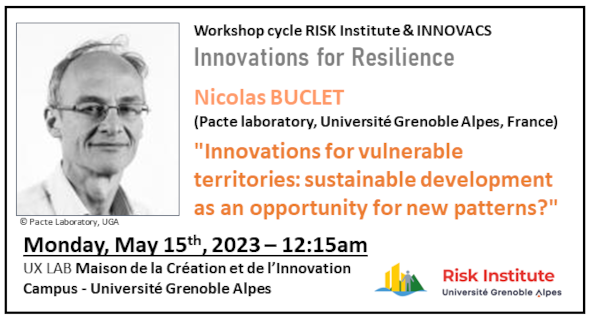- Share
- Share on Facebook
- Share on X
- Share on LinkedIn
Workshop, Encounter/Debate / Event in French, Innovations for Resilience, Partnerships, Research
On May 15, 2023
Saint-Martin-d'Hères - Domaine universitaire

From September 2022 to July 2023, one Monday/month during lunch break, the Risk Institute proposes with INNOVACS a research workshop cycle opened to all academics and professionals to address the issue of citizens’ involvement in vulnerability reduction and risk management through easy-to-use, and light technologies.
Registration is free but mandatory. Remote access is possible on request.
WORKSHOP #8: MAY 15TH, 2023
"Territorial Ecology and Socio-ecological Transition - Innovations for vulnerable territories: sustainable development as an opportunity for new patterns?"
by Nicolas BUCLET (Pacte laboratory, Université Grenoble Alpes, France)
Language: French
Book: Ecologie territoriale et transition socio-écologique, Nicolas Buclet, Volume 35 - Série Smart Innovation, ISTE Editions, janvier 2022, 196 pages
Abstract
Faced with climate disruption, the massive disappearance of biodiversity, and the shortage of a growing number of strategic resources, the evolution of society must be thought of in a systemic way. This is what territorial ecology proposes, based on the analysis of the metabolism of human societies and the measurement of the circulation of flows representing the materiality of these societies.
Territorial Ecology and Socio-Ecological Transition presents this interdisciplinary approach based on the optimization of flows (water, energy, waste, etc.), while introducing new methodological developments. In particular, it addresses the following fundamental questions: Who is at the origin of the circulation of flows? With what motivations? Who has the power to decide on this circulation? Particular attention is given to the analysis of the interactions between the actors who are at the origin of the circulation of flows, or who influence it. The book also insists on the way to link the methods developed with political principles likely to favor the socio-ecological transition.
This approach, between a material description of the functioning of human societies and an analysis of decision-making processes, is an aid to the elaboration of diagnoses and strategies on a territorial scale.
WORKSHOP CYCLE 2022-2023 - FULL PROGRAM
1st part of the cycle: The digitalisation of essential services
. October 17th, 2022
The digitization of public action / Citizens inclusion issues
Périne BROTCORNE, (Louvain University, Belgium)
(FR - English Material)
. Postponed to January 30th, 2023
E-Health & Health Crisis: Teleconsultation Devices - Caregivers’ perspectives
Marie BERTHOUD (Lille University, France)
(FR - English Material)
. December 5th, 2022
Mobile (for) development : when digital giants take care of the poor.
Marine AL DAHDAH (CNRS, CEMS, French Institute of Pondichery, India)
(English)
2nd part of the cycle: Involving users? New trends in design methodologies
. February 20th, 2023
Digital fabrication and resilient manufacturing
Lucia CORSINI (IFM Consultant) and Valeria DAMMICO (Cambridge University & Polytechnique-Paris, France)
(English)
. March 20th, 2023
Making, experimenting and documenting low tech. The Farmer fablab case / Fabriquer, expérimenter et documenter les low tech. Le cas de l'Atelier Paysan.
Morgan MEYER (Mines Paris Tech, France)
(French - English Material)
. April 3rd, 2023
The participatory patient in the geriatric health living lab
Dimitri VOILMY (Université de Technologie de Troyes, France)
(French - English material)
. April 24th, 2023
Innovations in Crisis Management and Response: digital humanitarians and early warning, early action systems
Kees BOERSMA (University of Amsterdam, Netherlands)
(English)
3rd Part of the cycle: Innovations, vulnerabilities and territories
. May 15th, 2023
Territorial Ecology and Socio-ecological Transition - Innovations for vulnerable territories: sustainable development as an opportunity for new patterns?
Nicolas BUCLET (PACTE Lab., Université Grenoble Alpes, France)
(French - English Material)
. June 12th, 2023
Thermalism, vulnerability and territories
Adrien SONNET (Université Caen Normandie, France)
(French - English Material)
July 3rd, 2023 - Workshop cycle conclusive conference
Gérald GAGLIO (Universite Côte d'Azur - Nice, France)
(French - English material)
RISK INSTITUTE: THE “INNOVATIONS FOR RESILIENCE” CLUSTER OBJECT
Coordination: Jean-Luc Bosson (TIMC-Imag), Jean-François Boujut (G-Scop), Céline Cholez (PACTE)
The cluster Innovations for resilience is a multi-disciplinary research group (sociologists, geographers, historians, engineers, climatologists and geo-scientists, hydrologists, architects, physicians, managers, communicators...) involved in undesrtanding the spreading of "people-centered innovations" to make them actors of crisis management and enhance their resilience.
Actually, in a few years, many “smart” innovations explicitly dedicated to different types of crises management or vulnerabilities reduction have been developed by public and private players worldwide in order to integrate public concerned or recognized as concerned. The cluster research mainly tackles smart, decentralized, often small, and “easy-to-use” innovations that for some, benefit from the recent progress of microelectronics and digital industries, from the trend of artificial intelligence and the internet of things. This contributes to widespread agile and economical solutions (small sensors, mobile apps, for example) that, coupled with institutional innovations, are expected to complete or replace institutional and experts centered traditional responses.
Many of these innovations originate in a public-private partnership; they concern many different geographical and political territories; some are market-driven, some are “bottom-up” (emerging from a grass-root innovation process). The public concerned, the “end-user,” can both appear as a target and a producer of information (Al Dahdah, 2019), sometimes through a community commitment but also as a human virtual or physical sensor (Goodchild, 2007).
A significant issue the cluster addresses is analyzing the extent to which these innovations drive a change in the risks’ governance with a more inclusive perspective.The cluster’s program mainly addresses issues related to:
- change in design methodologies (users’ centered, frugal, grass-roots innovation) at all stages from idea to prolonged usage with a challenge about the integration of learning from crisis and vulnerability experiences approaches (as recommended in risk cycle management) and long and ordinary existing practices regarding risk phenomenons;
- legal and public policy dimensions especially privacy regarding data capture, responsibilities’ transfer, and insurance regime implications, market regulations for public stakes (health, natural and industrial risks) and sustainable economic model;
- change in risks’ expertise role, in experts’ position and capacities of action confronted to the emergence of new actors and possible change in institutional and power relations.
The cluster Innovations for resilience lead research projects (master, phd, seniors researchers), in partnerships with different territories, foster new partenerships and provides scientific animation on these topics toward Grenoble research communities but also internationally: Kyoto University-Japan, Swansea University-Wales, Denver Colorado University (USA), the International Center for Frugal Innovation (Delft, Leiden et Rotterdam Universities, Nederland).
Date
12 noon - 1:45 PM
Localisation
Saint-Martin-d'Hères - Domaine universitaire
MACI
Nicolas BUCLET

Pacte Laboratory, UGA (France)
Geographer, Territorial ecology, Sustainable territorial development, Economics of conventions
Contact
Céline CHOLEZ, Cluster Innovation for Resilience, RISK Institute & PACTE Lab., UGA
Celine.Cholez(@)grenoble-inp.fr
- Share
- Share on Facebook
- Share on X
- Share on LinkedIn
